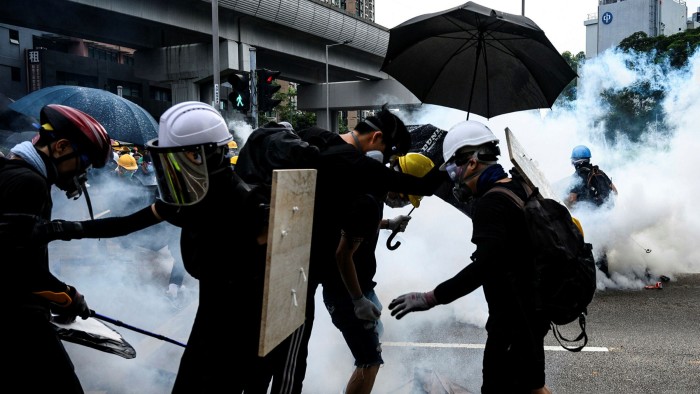Foreign business in Hong Kong looks to the long term


Roula Khalaf, Editor of the FT, selects her favourite stories in this weekly newsletter.
In the late summer and early autumn of 2019, Hong Kong was engulfed in turmoil. In August, the territory’s airport was occupied by protesters, briefly halting its operations, and a few months later the Chinese Communist party’s celebration of its 70th anniversary in power was overshadowed by yet more violent clashes on the territory’s streets.
At the height of the uncertainty in Hong Kong, Chinese financial regulators convened an emergency meeting in Beijing, according to people familiar with the event. If the worst came to the worst in China’s premier international finance centre, the regulators asked the financial and legal experts invited to the brainstorming session, what could they do in Shanghai to help that city step into the breach?
The answer, it quickly emerged, was not much. When Chinese lawyers in attendance said Shanghai would need to create some sort of Common Law enclave, free from party interference, to match the international seamlessness of Hong Kong’s judicial system, it was recognised that was politically impossible.
Beyond that there were other hurdles more frequently discussed in the traditional Shanghai vs Hong Kong rivalry debate, such as the mainland’s strict capital controls and its inability to counter the former UK colony’s low tax rates or the benefits stemming from its separate, US dollar-pegged currency.
Luckily for the regulators, the end of Hong Kong was in fact not nigh.
Relentless arrests of pro-democracy protesters and legislators, as well as the eruption of the Covid pandemic in early 2020, helped the government snuff out the movement. When President Xi Jinping arrives in the territory on Friday to celebrate the 25th anniversary of its return to Chinese sovereignty, the spectacle will be akin to that of an emperor descending triumphantly on a rebellious outpost that his generals have finally crushed.
The success with which the CCP struck back in Hong Kong does, however, invite questions similar to those considered by China’s financial regulators in the autumn of 2019 about the importance of its legal system. In particular, can the Chinese and Hong Kong governments undermine the territory’s previously robust rule of law in the civil and political sphere without compromising its attractiveness as a financial and business centre?
Hong Kong’s laws and judges used to protect civil freedoms as robustly as they did the sanctity of financial and commercial contracts. That is no longer the case. Under the national security law that Xi imposed on the city in 2020, democracy activists are routinely denied bail and jailed for speech and acts that were previously tolerated.
But most financial services professionals say the national security law is not an existential concern for their employers. “We’ll be in Hong Kong as long as there is a demand for our services and we can get talented people to work there,” one recently told me. He added that the territory’s still strict Covid quarantine requirement was a far bigger threat to its attractiveness than the national security law, but the former — as frustrating as it is now — is in the grander scheme of things ultimately a short-term problem.
“You’re a brave person if you bet against Hong Kong long-term,” said another executive who has lived and worked there for decades. “Although the legal system and political differences with the mainland are eroding, it’s still low-tax, has a different financial system and will relax Covid controls at some point.”
By contrast Jerome Cohen, an expert on China’s legal system, is a harsh and outspoken critic of Xi’s policies in Hong Kong and elsewhere. He and Geremie Barmé, one of the world’s leading Sinologists and founder of chinaheritage.net, have both invoked a famous quote from Tacitus in their critiques: “They make a desert and call it peace.”
But Cohen has no illusions that banks, companies and investors will significantly alter their behaviour in Hong Kong. So long as the party preserves their capital markets oasis, they won’t worry too much about the surrounding desert.
“It’s no surprise if most bankers and business people evaluate Hong Kong’s future differently from the way others more broadly concerned with political development and human rights do,” Cohen says. “Just as in [mainland China] and too many other countries, foreign business always adjusts its expectations and conduct to the existing environment, often with great profit.”
tom.mitchell@ft.com
Comments